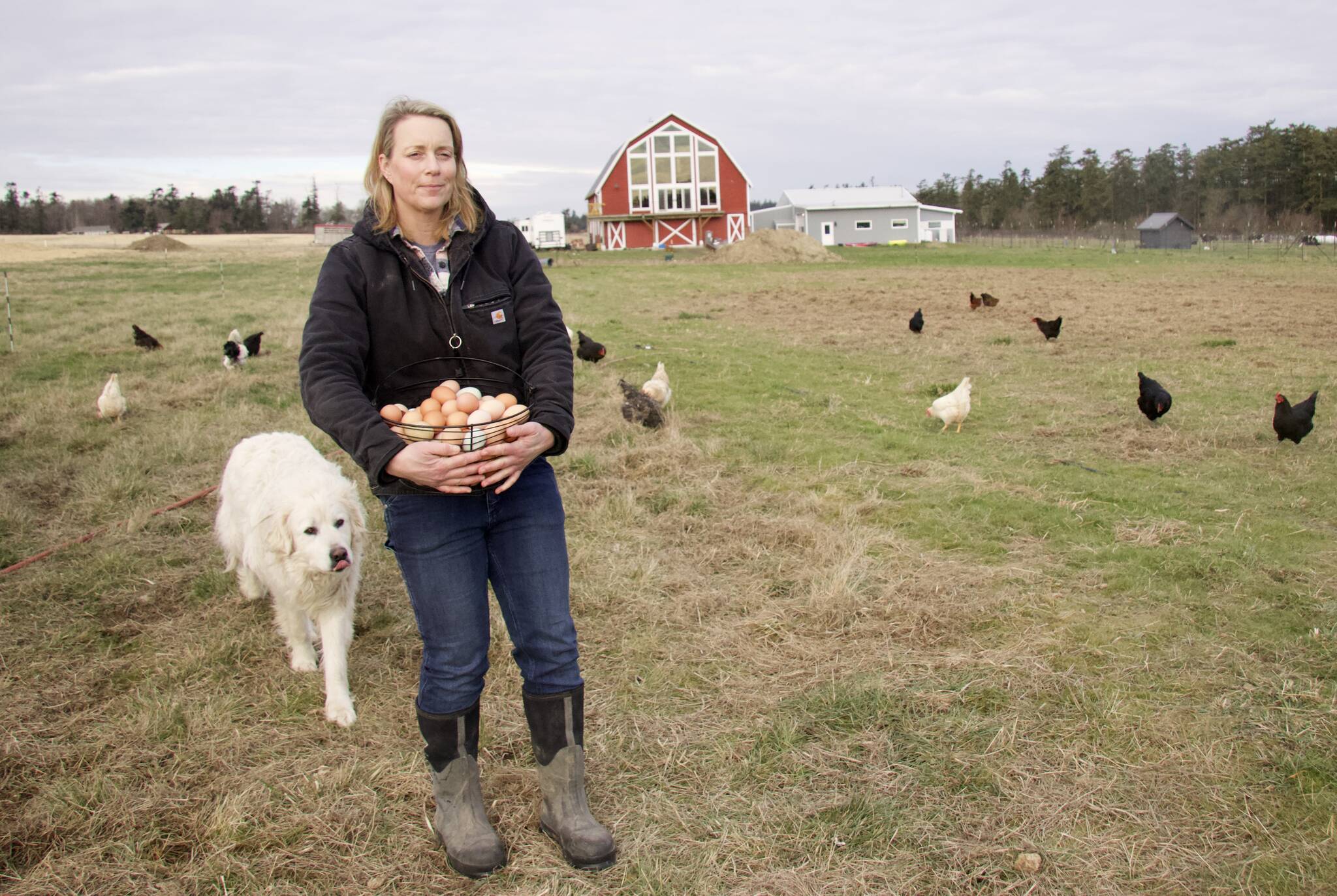Along with the rest of the country, Whidbey Island is seeing the effects of “eggflation,” with grocery store customers shelling out more money than ever for cartons of eggs.
Luckily, Whidbey Island hasn’t been hit by the bird flu that has killed millions of chickens and devastated the national egg industry. For residents who prefer to buy their eggs from Whidbey farms or roadside stands, the cost, quality and quantity of the chicken-created product is largely unchanged.
In fact, the egg crisis has spurred more people than ever to seek out those laid by Whidbey’s free-ranging fowl.
Shannon Bly, executive director of Whidbey Island Grown Cooperative, said the online store of locally produced goods, the Food Hub, has not been affected by the national egg inflation trend.
“Our eggs are island grown and our prices were already a bit above the grocery store,” Bly wrote in an email. “If anything, our producers’ egg prices are now more comparable with grocery stores.”
The Food Hub sells eggs from 1902 Ranch, a farm in Coupeville owned by Brooke and Bart Crowder. The couple raises pigs, cattle and chickens. At the beginning of November, Brooke Crowder could confidently say she had 300 chickens but has since lost several — not to the flu, but to coyotes.
Recently, she’s had more people reach out to her directly for more eggs after she sold out at the Food Hub.
“I have more demand now than ever,” she said.
Avian flu is not the only driver of egg prices. She said the cost of chicken feed has gone up, which was surprising to her and her husband as new farmers. Even the cost of egg cartons have risen.
Crowder said she was forced to raise prices in January after she avoided it for the entire year of 2022.
“Our margins were super thin,” she said.
On the South End of the island, Jake and Aja Stewart at Sweetwater Farm in Clinton have 120 chickens, as well as several ducks and turkeys. Stewart said he’s noticed duck eggs are becoming more popular due to their flavor and creamier texture.
Stewart said the avian flu outbreak is one of several issues that have affected farming and the global food economy. He dealt with supply issues during the pandemic, rising shipping costs and the effect of severe weather events and global conflicts.
“I think it all emphasizes the importance of something we’re blessed to have here on the island, and that is a strong local food system,” Stewart said.
He believes Whidbey’s supportive community around local food is good for food security and food production diversity, as well as representing a significant sector of the economy on the island.
Stewart also pointed out that winter is the time of year when chickens naturally lay fewer eggs. The farm is currently not selling any eggs because of this and, therefore, have not had to increase prices, but he acknowledged it is a possibility in the future.
To prevent avian flu, Stewart said he has been mindful of where he lets the birds free range and has been careful about what comes in and out of the farm.
The Ballydidean Farm Sanctuary, also in Clinton, has taken many precautions against the bird-killing disease. The sanctuary houses former farm animals, including chickens and ducks. Owner Ansel Santosa said he put the birds in quarantine, or “flockdown,” in April of 2022. The birds were kept in a large greenhouse and were not allowed outside until mid-July, when it had been two weeks without a new case in Western Washington.
Now the birds can venture outside but there is netting so that wild birds cannot share their food and water, which is a way the disease can be transmitted.
“It feels like the right balance of quality of life to risk avoidance,” Santosa wrote in an email. “I think the bird netting is the new normal for us.”
He said previous avian flu outbreaks died off in the summer, but managing the prevention of the disease is turning into a constant, similar to COVID-19, this time around.
According to the Centers for Disease Control and Prevention’s website, the most recent flock outbreak in the United States occurred on Jan. 27. The most recent case in Washington occurred on Jan. 19 in Snohomish County. Data from the U.S. Bureau of Labor Statistics show that the average price of a dozen large eggs is currently $4.25, compared to $1.79 in December of 2021.
According to the CDC, since 2022 over 58 million poultry and over 6,000 wild birds in 47 states have either died as a result of the flu or have been killed due to exposure to infected birds. The number surpassed the previous largest bird flu outbreak in 2015 when 50.5 million birds in 21 states were killed.
The U.S. Department of Agriculture states on its website that the avian flu is caused by an influenza type A virus and can infect poultry and wild birds, especially waterfowl. The highly pathogenic avian influenza virus strains are extremely infectious and can spread rapidly. Earlier this month, The Everett Herald reported on a Monroe farm that lost its entire flock of 170 ducks due to the disease.
The website for the CDC states that avian flu poses little risk to humans. There has been one reported human case in the U.S. in New Mexico. In Washington, there have been over 40 reported flock outbreaks since the spring of 2022. None have been reported in Island County.



